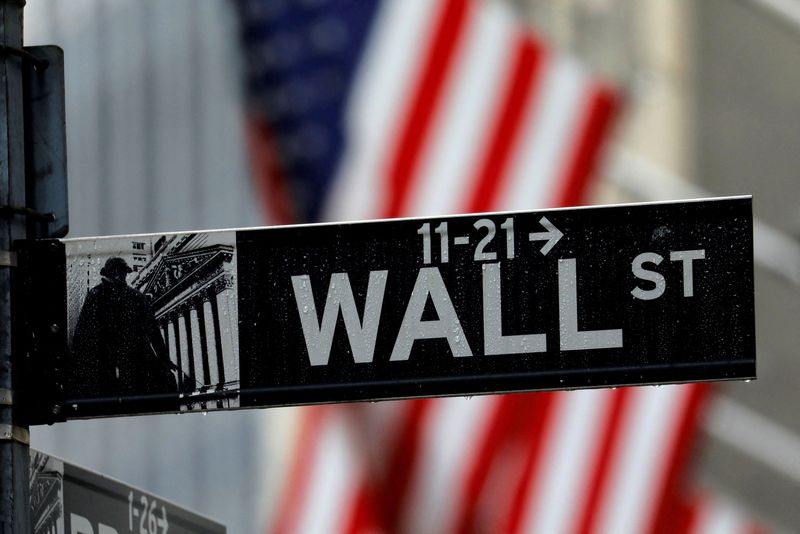U.S. tax bill may drag on earnings, cause buyback rush; gives some sectors a boost
2022.08.08 20:29

FILE PHOTO: Raindrops hang on a sign for Wall Street outside the New York Stock Exchange in Manhattan in New York City, New York, U.S., October 26, 2020. REUTERS/Mike Segar/File Photo
(Reuters) – The climate, healthcare and tax bill passed by the U.S. Senate over the weekend could shave corporate earnings slightly and trigger a rush of share repurchases, while giving a boost to some sectors like electric vehicle makers, biofuel and solar energy.
The $430 billion Inflation Reduction Act bill would impose a new excise tax on stock buybacks and a minimum 15% tax on corporations. The bill now heads to the Democratic-controlled House of Representatives, which is expected to pass it on Friday. It will then be signed into law by President Joe Biden. The tax changes would be effective from next year.
The two taxes are estimated to lower 2023 earnings per share of S&P 500 companies by roughly 1.5%, according to a research note by Goldman Sachs (NYSE:GS), which said that larger declines would be expected in low effective tax rate sectors such as healthcare and IT.
UBS’s chief investment officer for the Americas, Solita Marcelli, similarly estimated the proposed new taxes would have “a very minimal 1% drag on S&P 500 earnings per share, although some companies will be more affected than others.”
Still, some investors predicted a corporate buyback rush.
“The number one thing that stands out is that you’re going to see an acceleration of buybacks before the end of this year,” said Thomas Hayes, chairman and managing member of New York-based Great Hill Capital. “Companies would rather not pay that tax … They have this window, and you can be assured they’re going to take advantage of it.”
Buybacks hit a record $281.0 billion in the first quarter of 2022, according to S&P analyst Howard Silverblatt, although they fell 17.4% in the second quarter. He did not, however, see the 1% tax inhibiting corporate buybacks overall.
Jaret Seiberg at Cowen Washington Research Group likewise said it was hard “to see companies changing their behavior” in response to the 1% tax. There is a risk, though, that taxing dividends becomes an “easy way to raise additional money” and that Congress raises the 1% in future, he added.
Some sectors, meanwhile, got a boost on Monday, with shares of U.S. automakers including Tesla (NASDAQ:TSLA) Inc, Rivian Automotive Inc, Ford Motor (NYSE:F) Co, General Motors Co (NYSE:GM) and Lordstown Motors Corp rising between 1% and 2% in early trade.
The bill creates a $4,000 tax credit for used electric vehicles and provides billions in funding for EV production.
“Some of the subsidies and incentives for EVs will be helpful and will help Ford and GM and Teslas of the world to get more orders,” said Hayes. He added that the biggest beneficiary will be Tesla.
Biotech and pharma stocks should rebound after some uncertainty because the bill is “less onerous than initially anticipated as it relates to negotiating drug prices,” Hayes said.
“All in all, it’s a net positive,” Hayes said.
Shares of biofuel producers gained on Monday, including Darling Ingredients (NYSE:DAR), Neste, Gevo (NASDAQ:GEVO) Inc and Renewable Energy Group (NASDAQ:REGI) as they are expected to receive a boost from the extension of the biofuel blenders tax credit and addition of sustainable aviation fuel tax credits included in the Act.
Meanwhile, First Solar Inc (NASDAQ:FSLR) shares rose on analyst upgrades in the wake of the Senate passing the bill.








